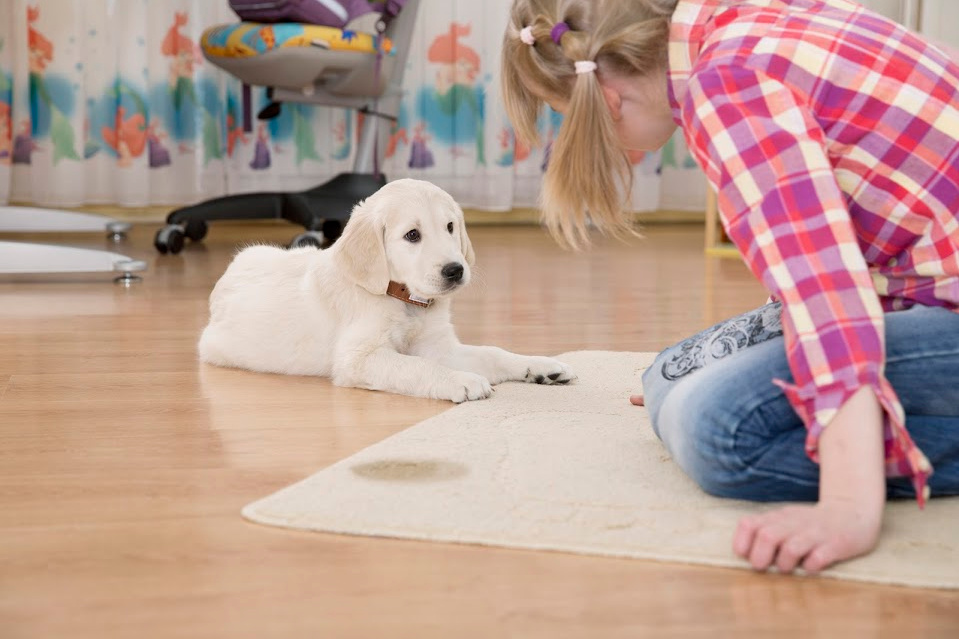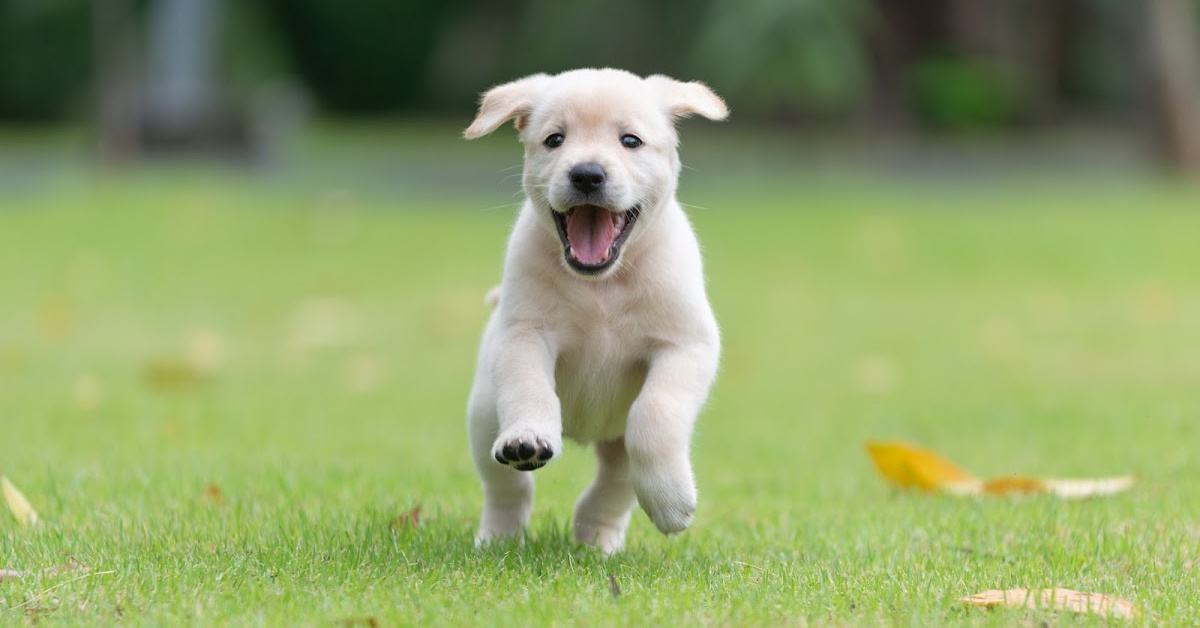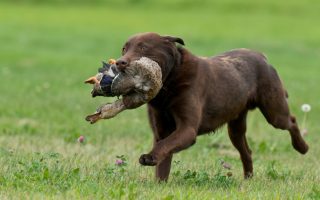Are you wondering how to train your Labrador puppy or when to start training your puppy?
Don’t worry. This article will give you an overview of what your Lab pup is capable of learning at certain months.
Labrador retrievers are well-known for being smart dogs that can learn many tricks easily. Because they are generally so willing to please, Labrador owners may find themselves getting carried away with puppy training.
However, you need to learn what your Lab can and cannot handle learning at specific ages and stages of their lives to make sure you are neither overwhelming nor underwhelming them.
While no two trainers will ever agree exactly on what are the training stages that these little Labradors should go through, an approximate Labrador puppy training schedule will give you a rough guide on what to expect from a pup at each age.
Labrador Puppy Training Schedules
Training Your Lab at 0-8 Weeks
Frankly, you don’t need to train your Lab puppy for the first 2 months of their lives.
At this stage, they will be busy learning the basics of living, from sleeping and drinking milk to opening their eyes and learning how to walk.
Hence, you don’t need to worry so much about puppy training since they are still learning more about the world. Instead, we recommend that you just enjoy your time with them.
Training Your Lab at 2 Months
Encourage your Labrador to learn how to follow you. Take a few steps away from your Labrador puppy and call their name. Once they reach you, pet them or give them a treat and then repeat.
You also need to teach your puppy to “recall”. Recall can be taught by having your dog go to you even when there is a distraction. You can use a whistle to help grab their attention. Make sure to give them treats and rewards to show them that you are worth ignoring other distractions.
Your Labrador also needs to learn how to socialize with other people and dogs daily. You can do this inside and out of the house.
Your puppy may want to bite everything they can at this stage, so you have to discourage this behavior.
You can also teach them how to take food from your hand without biting you or snatching the food from your hand.
One important thing you have to remember, however, is that you should neither expect too much from your puppy nor should you correct them at this phase.
Just like a very young child, your Labrador retriever puppy is impulsive, has little self-control, and has a short attention span at this age.
Because of this, you have to be patient and to let them be sometimes during this point of their puppyhood.
Training Your Lab at 2 ½ – 3 Months
Since you will be walking your Labrador puppy daily, make sure that they learn how to walk on your left side and not to run in front of you. You can use a clicker heel to help you with this. You should also continue with your recall training.
Again, it is important to keep their socialization skills up at a young age. Puppies take awhile to control their urges, so you need to discourage their biting tendencies.
Another thing that you can teach your Lab pup is to use their nose to touch your hand. This training cue is important since it teaches your Lab that an outstretched hand is not a threat.
Training your Labrador pup to do this at an early age can help prevent the escalation of behavioral issues.
As their name suggests, you can also start teaching your Labrador retriever how to retrieve at this stage. Encourage them to chase an item and bring it back to you.
Training Your Lab at 3 – 4 Months

Some Labrador puppy training cues that you will need to continue at this age include recall, socialization, retrieving, and bite inhibition. It is important to instill these lessons in your Lab as often as you can.
As you walk your Labrador retriever more, and as they understand when their bathroom schedules are, you may notice less accidents in your home.
Your Labrador retriever may also be at their peak of wanting to bite everything, so just be firm and consistent with your training.
You can also train your Lab to enter their basket or bed. You can point at the basket and once they enter it, you can give them a treat to reward their obedience. Keep repeating this until your dog does it without needing a treat. Once your Labrador has mastered a trick, you will notice that a simple pat on the head will be enough of a reward.
You can also start teaching them some of the classic dog tricks. You can introduce them to three positions like sit, stand, and down.
Bear in mind that you should only teach your Lab pup a trick one at a time, though. Do not move on until they have mastered one.
Make sure also to take a day off before teaching the next one and to repeat each newly learned trick every day. This way, you can reinforce in them the lesson that you were trying to train them on.
Training Your Lab at 4 – 5 Months
At this age of your Labrador’s puppyhood, you want to make sure that your Lab has slowly started to master recall, bite inhibition, and socialization. Do not forget to remind them about the basic tricks that they learned (e.g., sit, down, etc.).
Your 4-month-old Labrador puppy should also be potty trained by now. However, you should still be patient with your pup since accidents may still happen, especially if your Lab has been cooped up indoors for too long.
You can also teach your Labrador puppy how to heel for a short duration. Once you feel confident that they are good at heeling on command, try to add a few distractions to challenge them. Make sure the distractions are mild.
Training Your Lab at 5-6 Months
Try focusing on general obedience training at this stage. You will want to slowly advance the “sit” and “heel” commands. You can also add some distractions to make sure your dog is learning.
The goal here is to make sure that your dog listens to you and not pay attention to the distractions around them, so do not shock them with distractions. Just introduce the distractions slowly.
For instance, if you are teaching them to “sit” and “stay”, you can use meal time for practice. Tell them to sit and stay as you slowly put down their food bowl. Make sure to repeat the word “stay” and that they are seated. Once they show control over themselves and do not jump at the food, you can put the food bowl down.
How to Train Your Labrador Puppy at 6 Months Onward
Now that your Lab puppy has become a very bouncy adult, you can begin raising your standards on what to expect from your Labrador.
At six or seven months, your Labrador retriever is getting too big, so it’s vital that your Lab has learned the basics of their training and manners. Ask for more complex behaviors, too, at longer periods.
For instance, you can teach your Labrador pup to heel for longer distances past all all sorts of distractions. You can also teach them to sit and stay even when there are other dogs playing nearby.
Labrador Puppy Training in Your Own Time
Trainers and Labrador puppy owners share various opinions on when to start training a Labrador puppy.
However, bear in mind that there is no right or wrong answer here since it ultimately depends on you and your little Labradors.
Just be sure to make progress at a pace that your Lab is comfortable with and to keep training fun for both you and your puppy.
All in All
Remember, the key to training your Labrador puppy is patience and consistency. When you follow the guide above, you need to understand that your puppy is like a kid. It will take them a little time, but once they get the hang of it, it will be worth it!







